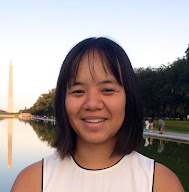Recent Alumna Uses Analytical and Language Skills at Center for Advanced China Research
Recent alumna Cady Deck, HNC Certificate '19 + SAIS MA '20, shares how her Chinese language and analytical skills developed at the Hopkins-Nanjing Center (HNC) and Johns Hopkins SAIS support her work as an analyst at the Center for Advanced China Research.
I'm currently working as an analyst at the Center for Advanced China Research (CACR). I actually met my boss in undergrad when I talked to him after a panel. I guess it's true that networking can be a very important part of the job search, even if one might not realize it at the time. In my current role, I focus on analyzing Chinese-language sources and media. Recently, I've been working a lot on Hong Kong and Taiwan, two portfolios that have been very active in the past year.
How often do you use Chinese in your current position or other skills you gained while studying at the HNC?
I'm happy to say that I use Chinese every single day at work because language plays a huge role in my company's analysis of Beijing's foreign policy. I monitor a lot of Chinese-language sites, do translations from Chinese to English, and read authoritative speeches, etc. Obviously, the HNC played a huge role in developing the language skills I use every day. My time at the HNC also taught me how to think critically about and conduct in-depth analyses on purely Chinese sources.
What was your favorite HNC course?
My favorite class at the HNC was either Ethnic Minorities in Chinese Society or Chinese Constitution. Any class with Professor Hua Tao is bound to be exciting and interesting and Ethnic Minorities in Chinese Society was no exception. That class piqued my interest in learning about the similarities and differences between various ethnic groups along the China-Myanmar border and how that affected local politics, society, and culture. Chinese Constitution was also one of my favorite classes because we had the freedom to discuss any topics related to Chinese law, including contemporary legal cases. As a small class of six people, we had in-depth conversations about whichever topics most interested us. Analyzing the Chinese Constitution and comparing it to the US Constitution was a fascinating experience that gave me insight into Chinese politics and bureaucracy at a fundamental level, which has also proven to be very helpful in my current job.
What is a favorite memory from the HNC?
One of my favorite memories from the HNC was the research trip we took to Shangri-La in Yunnan Province. As part of our research, we interviewed local shopkeepers about inter-ethnic minority relations in the region. The most interesting interview that my classmate and I conducted was with an older woman who was a street sweeper. We talked with her for about 20 minutes and it turned out that she had this incredibly interesting life story that involved marrying a man from a different ethnic minority and trying to navigate the difficulties of government policies for her marriage and her daughter. In the classroom, we learned about many of these government policies but hearing firsthand experiences from locals was an amazing opportunity. Since the research trip happened over fall break, we all gathered in someone’s hotel room and celebrated Thanksgiving by eating KFC. The trip was far from perfect in many aspects, but I made two of my best Chinese friends during the trip. It’s easy to be sucked into one bubble of friends at the HNC, and while I certainly had a core group of friends there, this trip helped me realize that making that extra effort to connect with people outside of the classroom was equally as important and a valuable part of the HNC experience.
I think the HNC is going to be very valuable in the next 35 years, especially as US-China relations evolve. The HNC is unique in its ability to bring together Chinese and international students and professors. It offers one of the only programs for international students to read and discuss academic articles in Chinese with Chinese professors and peers in China. Gaining a better understanding about each other’s perspectives and being able to talk through current global issues openly is something that is extremely valuable as academic institutions seek to develop the next generation of policymakers, diplomats, analysts, etc. In an era when US-China relations seemingly continue to spiral downward, the HNC can play a pivotal role in connecting people with different opinions from very different backgrounds and provide them with a forum to engage with each other.
The HNC solidified my desire to work in US-China relations. After college, all I knew was that I was interested in China and international affairs, but also political science and domestic politics. So really, I had no idea what I wanted to do. Going to the HNC helped focus my career ambitions and gave me a new community of close friends and peers from a variety of different backgrounds. While I learned a lot in the classroom, I learned equally as much, if not more, from the immersive experience of living with a Chinese roommate in a city teeming with history. In a semi-unrelated note, it also renewed my interest in running because I could see much more of the city (and get very lost) in a shorter period if I did it on foot at an increased speed. Now the first thing I do when I arrive in a new place is to lace up my running shoes, take off in any direction, get lost, and then try to find my way back.





